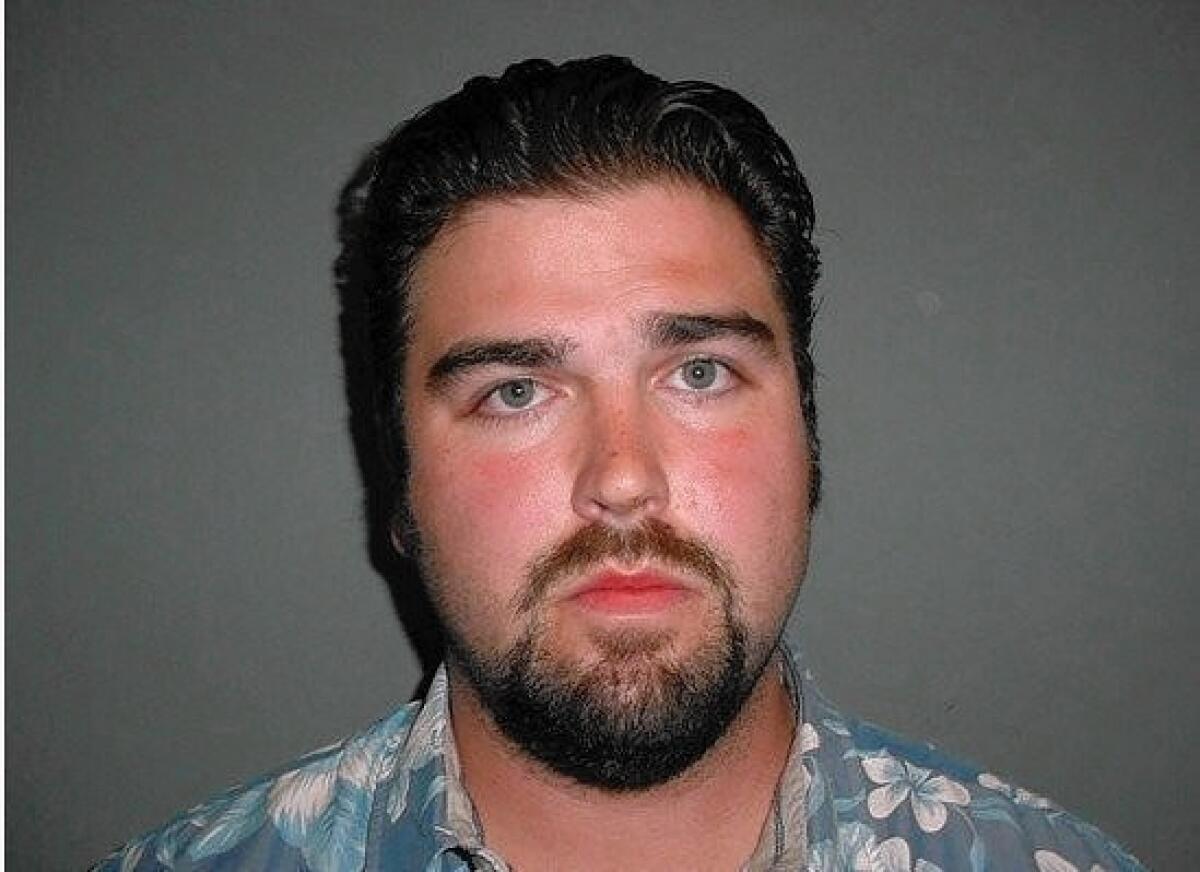Convicted killer Wozniak’s attorney accuses deputies of using snitches and withholding evidence

The defense attorney for convicted Costa Mesa murderer Daniel Wozniak railed against the Orange County Sheriff’s Department in court Thursday, accusing deputies of targeting his client with jailhouse informants and then deliberately withholding evidence of their efforts until after a jury voted for the death sentence.
“They want him to be executed and they know it’s going to happen,” public defender Scott Sanders said during an occasionally heated hearing.
Over the span of two days this week, Sanders questioned three sheriff’s department officials on their record-keeping practices and use of snitches.
On Thursday, he pleaded with Superior Court Judge John D. Conley to let him interrogate more deputies about why they waited until a few weeks ago to disclose a log of their interactions with informants.
The log, which stretches from 2008 to 2013, contains about 80 pages of records that referenced Wozniak or Fernando Perez, a prolific informant Wozniak spoke to while in Orange County Jail.
Sanders contended that the log shows law enforcement sent an informant to talk with Wozniak and possibly coordinated with the Costa Mesa Police Department, which investigated Wozniak for the 2010 killing of Army veteran Samuel Herr, 26, and his friend, Juri “Julie” Kibuishi, 23, both of Costa Mesa.
Sanders pointed to an entry in the log that said a deputy spoke with Perez about Wozniak and told him to “marinate the Costa Mesa info.”
It’s unclear what the statement meant, but Sanders argued he should have had the chance to investigate it before Wozniak’s trial, which concluded in January.
“More evidence than we ever had are in these notes,” Sanders said.
He plans to file a motion asking Conley to grant a new trial or bar the death penalty as an option.
“I don’t think you should execute people in a county where this kind of stuff is going on,” Sanders said.
As the hearing came to a close Thursday, Sanders fiercely argued that he should be allowed to call more witnesses, including the deputy who disclosed the log after keeping it a secret for years.
Conley, however, stopped the questioning, saying the answers likely wouldn’t affect Wozniak’s already concluded trial.
The contents of the log appeared to be routine, he said before reciting an entry.
“I contacted Costa Mesa PD,” the log reads. “Left a message for Detective Morales on the Wozniak case.”
“So?” Conley said of the entry, before Sanders interrupted.
“So? So? We never had that before,” Sanders said, almost shouting. “Can you think like a defendant for once, your Honor?”
“Control yourself,” Conley replied.
“You’re trying to make sure he gets executed and the appeal stands,” Sanders said, accusing Conley of only being interested in preserving the case’s integrity instead of Wozniak’s rights.
“Counsel, you’re on the verge of disrespectful,” Conley said, declining to alter his decision.
The judge also said the records appeared to be irrelevant because prosecutors in the Wozniak case did not use any evidence gleaned from jailhouse informants.
Conley has tried to avoid delaying Wozniak’s sentencing date on May 20, almost six years to the day after Herr and Kibuishi were murdered.
I’m not saying he doesn’t have legitimate gripes, but not in this case. Dan Wozniak still killed two people. He still put two bullets in my son’s head. He still killed Julie.
— Steve Herr, father of victim Samuel Herr
Sanders admitted the case’s slow pace has been frustrating for the victims’ families, but “the frustration should be with them,” he said, pointing to the lawyers for the district attorney’s office and sheriff’s department. “They made this. They made this ridiculous.”
Herr’s father, Steve Herr, bristled at Sanders invoking him and other family members.
He blamed Sanders for the delays.
“I’m not saying he doesn’t have legitimate gripes, but not in this case,” Steve Herr said. “Dan Wozniak still killed two people. He still put two bullets in my son’s head. He still killed Julie. He still dismembered my son.”
The week’s hearings were kickstarted Tuesday when sheriff’s officials turned over to Sanders portions of the log referencing Wozniak or Perez.
Under questioning from Sanders that day, Sgt. Kirsten Monteleone said a deputy named Ben Garcia showed her the log three or four weeks ago.
Monteleone said she’d asked Garcia if he had any writings he hadn’t turned over previously because of a surprise revelation in a separate murder case.
In February, a deputy named Robert Szewczyk disclosed in court that he’d kept four years worth of personal notes. This prompted Sanders to send a subpoena for any similar notes related to Wozniak and jailhouse informants. It also caused sheriff’s department officials to send out a department-wide memo asking deputies to disclose any personal writings.
In a follow-up conversation between Monteleone and Garcia, he revealed the log that cataloged multiple deputies’ daily interaction with snitches, according to testimony.
On Thursday, sheriff’s Sgt. Mark Peters testified that department has reworked how it keeps informant files within the past few years.
Any inmate who receives a benefit in exchange for information now has to be signed up as an informant in a centralized file where deputies should deposit notes about their interactions with the snitches.
Peters said that file is currently empty.
Sanders has been extremely critical of the use of informants in Orange County jails, arguing authorities can’t be trusted to disclose evidence they’ve gathered to defendants.
In March last year, Sanders convinced a judge to throw the entire district attorney’s office off the case of admitted Seal Beach mass killer Scott Dekraai. Superior Court Judge Thomas Goethals ruled that law enforcement had repeatedly violated Dekraai’s rights by failing to turn over evidence.
Conley did not take such a rare step Thursday.
He said the sheriff’s department appears to have “severe problems” retrieving documents, but that they didn’t affect the outcome of Wozniak’s case.
“The defendant had a fair trial,” Conley said.
--
Twitter: @jeremiahdobruck
